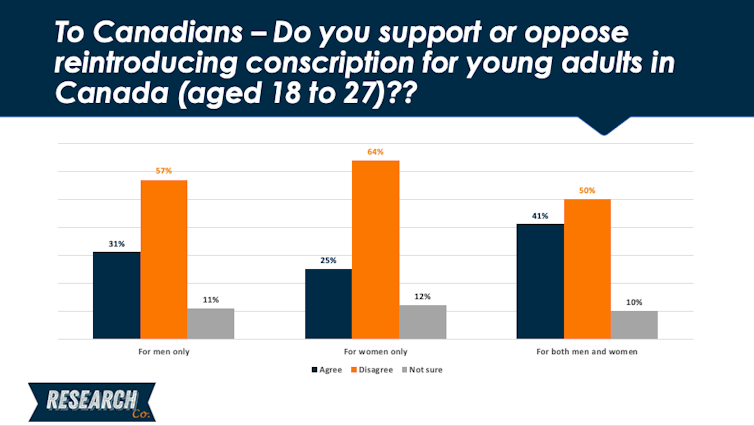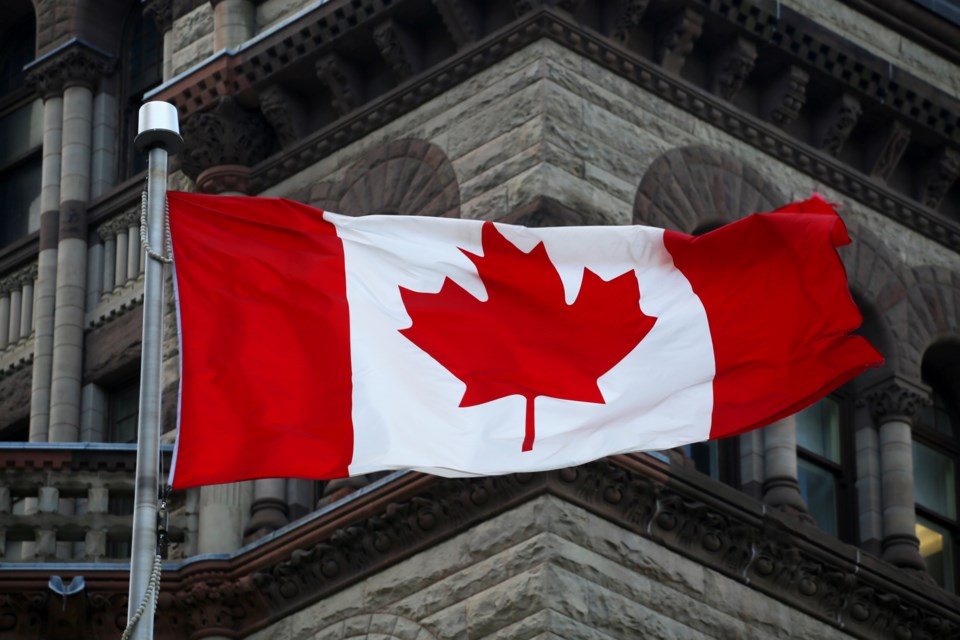As fighting in Europe and the Middle East continues, many countries are being forced to reconsider conscription of citizens.
Recent over forced military service have erupted , the , the and — countries that have largely abandoned forced military service.
Other countries , Latvia, Estonia and Sweden have adopted some form of mandatory military service either on a selective or broad basis, with . Like other European countries, both have conscription but have struggled with national borders to avoid fighting.
Canadians often forget that our country is with Russia, a factor that is making headlines as and foreign military flotillas of our warming Arctic waters.
Along with British youth opposing military conscription due to what they see as “elitist wars” and Canada’s current status with the U.S. as a a looming question is festering: what is Canada’s appetite for military service in the event of all-out war?
Canadians oppose forced military service
A recent poll I commissioned — conducted by the independent polling firm and to be made public soon — found that most Canadians (57 per cent) are either strongly (35 per cent) or moderately (22 per cent) opposed to military conscription in modern times if only men are to serve.
Survey results are based on an online survey conducted from July 24 to July 26 of 1,000 adults in Canada. The data has been statistically weighted according to Canadian census figures for age, gender and region in Canada. The margin of error — which measures sample variability — is plus or minus 3.1 percentage points, 19 times out of 20.
The poll found 67 per cent of Canadians either strongly or moderately oppose only women being conscripted — a practice that would be the first of its kind in the world. .
Similarly, if conscription did take place on a gender-neutral basis for both men and women, 50 per cent of Canadians would oppose it. With the exact reverse also holding true, a large percentage of Canadians may potentially support conscription if the right scenario arose.
Approximately 10 per cent of all Canadians are not sure whether they’d support conscription in any of the above scenarios. Only eight per cent of Canadians strongly support only women being conscripted while 18 per cent strongly support an only male conscription. Eighteen per cent of Canadians support conscription if it were gender-neutral.
Women respondents across all categories are the most opposed to military conscription regardless of gender. Male respondents, on the other hand, are more likely to support conscription if it’s gender-neutral.

Survey results across age categories show 18- to 34-year-olds are the most likely to both support and oppose conscription. If only women were conscripted, 39 per cent of 18- to 34-year-olds and 40 per cent of 35- to 54-year-olds would oppose conscription, with similar results for male-only service but an approximate five per cent less opposition across all ages.
Although the majority of respondents oppose conscription, all age categories are more likely to support conscription if it is gender-neutral.
Québec and Atlantic Canada showed the highest level of opposition to conscription in all categories. Those who voted NDP in the last election are substantially more likely to oppose all categories of conscription. Liberal and Conservative voters show only a small percentage of differences in both opposition and support.
Youth losing trust in the social contract
A well-funded, well-trained and well-equipped — like by the historic economist is likely the most viable solution to Canada’s future defence needs. It’s also the only model that is likely defendable under Canada’s Constitution in regards to individual liberty and security.
A professional volunteer army requires the government of Canada to maintain public trust in our country and a positive image of our military and public service.
If millennials and Gen Z youth do not see anything worth fighting for in Canada — including basic concepts like democracy and civil liberties — they will oppose calls for service, especially if conscripted by force.
Bryce J. Casavant has received funding from the Social Sciences and Humanities Research Council of Canada (SSHRC) and is a previous fellow. He is a Canadian Forces veteran and served between 2004-2010.




